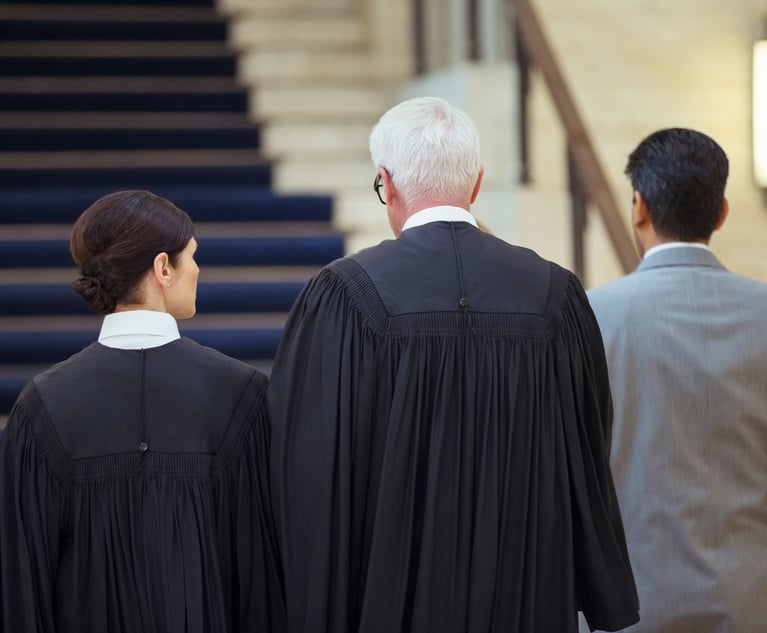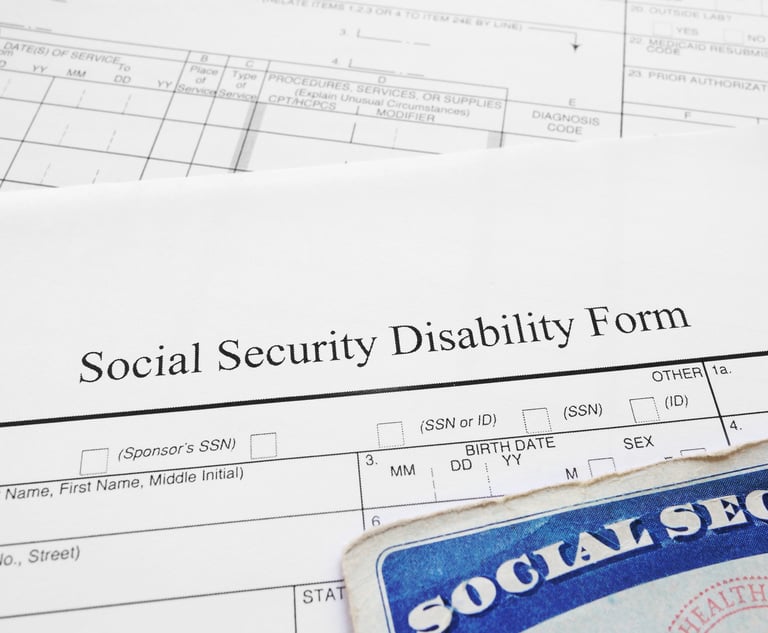Judicial Ethics Opinion 20-49
May a full-time judge volunteer as a disc jockey for a not-for-profit college radio station?
May 28, 2020 at 06:42 AM
3 minute read
The Advisory Committee on Judicial Ethics responds to written inquiries from New York state's approximately 3,600 judges and justices, as well as hundreds of judicial hearing officers, support magistrates, court attorney-referees, and judicial candidates (both judges and non-judges seeking election to judicial office). The committee interprets the Rules Governing Judicial Conduct (22 NYCRR Part 100) and, to the extent applicable, the Code of Judicial Conduct. The committee consists of 27 current and retired judges, and is co-chaired by former associate justice George D. Marlow of the Appellate Division and the Honorable Margaret Walsh, a justice of the Supreme Court.
Digest: A full-time judge may volunteer as a disc jockey for a not-for-profit college radio station.
Rules: 22 NYCRR 100.2; 100.2(A); 100.2(C); 100.3(B)(8); 100.4(A)(1)-(3); 100.4(C)(3); 100.4(C)(3)(b)(I), (iv); 100.4(D)(3); 100.5(A)(1); Opinions 16-63; 16-05; 09-192/09-231.
Opinion:
A full-time judge previously volunteered at a non-commercial college radio station and wishes to do so in the future. The judge's two-hour weekly program would air on weekend afternoons and feature music in the "classic rock" genre. The program would include occasional public service announcements, such as reminding people to vote on Election Day and informing students about on-campus events. The judge would not engage in any political discussions or commentary, would not participate in any fund-raising, and would not identify him/herself as a judge.
A judge must always avoid even the appearance of impropriety (see 22 NYCRR 100.2) and must always act to promote public confidence in the judiciary's integrity and impartiality (see 22 NYCRR 100.2[A]). A judge's extra-judicial activities must be compatible with judicial office and must not (1) cast reasonable doubt on the judge's capacity to act impartially as a judge; (2) detract from the dignity of judicial office; or (3) interfere with proper performance of judicial duties (see 22 NYCRR 100.4[A][1]-[3]). A full-time judge may not be an "active participant of any business entity" (22 NYCRR 100.4[D][3]) but may participate in a not-for-profit educational, cultural, or civic organization (see generally 22 NYCRR 100.4[C][3]). A judge must not lend the prestige of judicial office to advance any private interests (see 22 NYCRR 100.2[C]; 100.4[C][3][b][iv]) nor personally participate in soliciting funds or other fund-raising activities (see 22 NYCRR 100.4[C][3][b][I]). A judge also must not "directly or indirectly engage in any political activity" unless an exception applies (see 22 NYCRR 100.5[A][1]) and must not comment publicly on "a pending or impending proceeding in any court within the United States or its territories" (22 NYCRR 100.3[B][8]).
A full-time judge may engage in non-commercial avocational activities such as music or dance as a hobby (see generally Opinion 09-192/09-231) or participate in a non-commercial podcast concerning science fiction and comic book characters and legal issues that may arise in fictional works (see Opinion 16-05). Here, too, we see no impropriety in the judge's proposed role as a volunteer disc jockey at a non-commercial college radio station. The judge's participation is, of course, subject to generally applicable limitations on judicial speech and conduct, including the public comment rule (see 22 NYCRR 100.3[B][8]) and prohibitions on political activity and fund-raising (see 22 NYCRR 100.4[C][3][b][I]; 100.5[A][1]). As the judge expressly mentioned reminding people to vote on Election Day, we note this is permissible, provided it is strictly non-partisan (see Opinion 16-63 [part-time attorney judge may publicly display on his/her office building a non-partisan banner stating "Your vote counts in ___ County"]).
This content has been archived. It is available through our partners, LexisNexis® and Bloomberg Law.
To view this content, please continue to their sites.
Not a Lexis Subscriber?
Subscribe Now
Not a Bloomberg Law Subscriber?
Subscribe Now
NOT FOR REPRINT
© 2024 ALM Global, LLC, All Rights Reserved. Request academic re-use from www.copyright.com. All other uses, submit a request to [email protected]. For more information visit Asset & Logo Licensing.
You Might Like
View AllTrending Stories
- 1Call for Nominations: Elite Trial Lawyers 2025
- 2Senate Judiciary Dems Release Report on Supreme Court Ethics
- 3Senate Confirms Last 2 of Biden's California Judicial Nominees
- 4Morrison & Foerster Doles Out Year-End and Special Bonuses, Raises Base Compensation for Associates
- 5Tom Girardi to Surrender to Federal Authorities on Jan. 7
Who Got The Work
Michael G. Bongiorno, Andrew Scott Dulberg and Elizabeth E. Driscoll from Wilmer Cutler Pickering Hale and Dorr have stepped in to represent Symbotic Inc., an A.I.-enabled technology platform that focuses on increasing supply chain efficiency, and other defendants in a pending shareholder derivative lawsuit. The case, filed Oct. 2 in Massachusetts District Court by the Brown Law Firm on behalf of Stephen Austen, accuses certain officers and directors of misleading investors in regard to Symbotic's potential for margin growth by failing to disclose that the company was not equipped to timely deploy its systems or manage expenses through project delays. The case, assigned to U.S. District Judge Nathaniel M. Gorton, is 1:24-cv-12522, Austen v. Cohen et al.
Who Got The Work
Edmund Polubinski and Marie Killmond of Davis Polk & Wardwell have entered appearances for data platform software development company MongoDB and other defendants in a pending shareholder derivative lawsuit. The action, filed Oct. 7 in New York Southern District Court by the Brown Law Firm, accuses the company's directors and/or officers of falsely expressing confidence in the company’s restructuring of its sales incentive plan and downplaying the severity of decreases in its upfront commitments. The case is 1:24-cv-07594, Roy v. Ittycheria et al.
Who Got The Work
Amy O. Bruchs and Kurt F. Ellison of Michael Best & Friedrich have entered appearances for Epic Systems Corp. in a pending employment discrimination lawsuit. The suit was filed Sept. 7 in Wisconsin Western District Court by Levine Eisberner LLC and Siri & Glimstad on behalf of a project manager who claims that he was wrongfully terminated after applying for a religious exemption to the defendant's COVID-19 vaccine mandate. The case, assigned to U.S. Magistrate Judge Anita Marie Boor, is 3:24-cv-00630, Secker, Nathan v. Epic Systems Corporation.
Who Got The Work
David X. Sullivan, Thomas J. Finn and Gregory A. Hall from McCarter & English have entered appearances for Sunrun Installation Services in a pending civil rights lawsuit. The complaint was filed Sept. 4 in Connecticut District Court by attorney Robert M. Berke on behalf of former employee George Edward Steins, who was arrested and charged with employing an unregistered home improvement salesperson. The complaint alleges that had Sunrun informed the Connecticut Department of Consumer Protection that the plaintiff's employment had ended in 2017 and that he no longer held Sunrun's home improvement contractor license, he would not have been hit with charges, which were dismissed in May 2024. The case, assigned to U.S. District Judge Jeffrey A. Meyer, is 3:24-cv-01423, Steins v. Sunrun, Inc. et al.
Who Got The Work
Greenberg Traurig shareholder Joshua L. Raskin has entered an appearance for boohoo.com UK Ltd. in a pending patent infringement lawsuit. The suit, filed Sept. 3 in Texas Eastern District Court by Rozier Hardt McDonough on behalf of Alto Dynamics, asserts five patents related to an online shopping platform. The case, assigned to U.S. District Judge Rodney Gilstrap, is 2:24-cv-00719, Alto Dynamics, LLC v. boohoo.com UK Limited.
Featured Firms
Law Offices of Gary Martin Hays & Associates, P.C.
(470) 294-1674
Law Offices of Mark E. Salomone
(857) 444-6468
Smith & Hassler
(713) 739-1250










